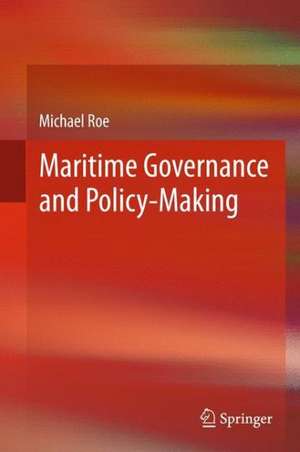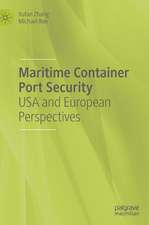Maritime Governance and Policy-Making
Autor Michael Roeen Limba Engleză Hardback – 21 iul 2012
A Post-modern interpretation of this globalized society prompts suggestions for change in maritime policy-making so that the governance of the sector better matches more closely the environment in which shipping and ports operate. Maritime Governance and Policy-Making is a controversial commentary on the record of policy-making in the maritime sector and assesses whether the reason for continued policy failure rests with the inadequate governance of the sector.
Maritime Governance and Policy-Making addresses fundamental questions of governance, jurisdiction and policy and applies them to the maritime sector. This makes it of much more interest to a much wider audience – including students, researchers, government officials, and those with industrial and commercial interests in the shipping and ports areas - and also of more value as it places the specific maritime issues into their wider context.
Maritime Governance and Policy-Making addresses fundamental questions of governance, jurisdiction and policy and applies them to the maritime sector. This makes it of much more interest to a much wider audience – including students, researchers, government officials, and those with industrialand commercial interests in the shipping and ports areas - and also of more value as it places the specific maritime issues into their wider context.
| Toate formatele și edițiile | Preț | Express |
|---|---|---|
| Paperback (1) | 1224.54 lei 6-8 săpt. | |
| SPRINGER LONDON – 9 aug 2014 | 1224.54 lei 6-8 săpt. | |
| Hardback (1) | 1229.10 lei 6-8 săpt. | |
| SPRINGER LONDON – 21 iul 2012 | 1229.10 lei 6-8 săpt. |
Preț: 1229.10 lei
Preț vechi: 1498.90 lei
-18% Nou
Puncte Express: 1844
Preț estimativ în valută:
235.26€ • 255.63$ • 197.75£
235.26€ • 255.63$ • 197.75£
Carte tipărită la comandă
Livrare economică 21 aprilie-05 mai
Preluare comenzi: 021 569.72.76
Specificații
ISBN-13: 9781447141525
ISBN-10: 1447141520
Pagini: 576
Ilustrații: XVI, 444 p.
Dimensiuni: 155 x 235 x 32 mm
Greutate: 0.77 kg
Ediția:2013
Editura: SPRINGER LONDON
Colecția Springer
Locul publicării:London, United Kingdom
ISBN-10: 1447141520
Pagini: 576
Ilustrații: XVI, 444 p.
Dimensiuni: 155 x 235 x 32 mm
Greutate: 0.77 kg
Ediția:2013
Editura: SPRINGER LONDON
Colecția Springer
Locul publicării:London, United Kingdom
Public țintă
ResearchCuprins
Failure? What failure?.- Governance.- Hierarchy.- The Nation-State.- Globalization.- Modernism.-Postmodernism.- Maritime Postmodernism in Practice.- So What Next?.
Recenzii
From the reviews:
“‘Maritime Governance and Policy Making’ which covers a wide range of topics in the field and provokes in-depth discussions on the failures of maritime governance practice. … a reference book which illustrates the vision shift on the perception of maritime governance with an easy-to-read and inductive structure. … The book is also a reference book for beginners in the field which discusses existing policies and the political history of maritime industry.” (Okan Duru, The Asian Journal of Shipping and Logistics, Vol. 29 (3), December, 2013)
“‘Maritime Governance and Policy Making’ which covers a wide range of topics in the field and provokes in-depth discussions on the failures of maritime governance practice. … a reference book which illustrates the vision shift on the perception of maritime governance with an easy-to-read and inductive structure. … The book is also a reference book for beginners in the field which discusses existing policies and the political history of maritime industry.” (Okan Duru, The Asian Journal of Shipping and Logistics, Vol. 29 (3), December, 2013)
Notă biografică
Professor Michael Roe currently holds the Chair of Maritime and Logistics Policy at the Centre for Maritime Logistics, Economics and Finance, Plymouth Business School, Plymouth University. He has previously worked with the Greater London Council, West Midlands County Council (Birmingham, UK), and the Universities of Aston, Coventry, London Guildhall and City. A graduate in Geography, with postgraduate qualifications in Transport Planning and Engineering and a Doctorate in Transport Welfare Economics, he is the author of over 60 refereed journal papers, 12 books and a large number of other publications. His research interests focus upon the problems of maritime governance. His wife, Liz, provides moral and intellectual support whilst his two children, Joe and Siân, provide entertainment and expenses. He has active interests in travelling, modern European literature, the historical development of Soviet Europe, restoring ageing VW Beetles, the work of Patti Smith and most importantly, the exploits of Charlton Athletic FC.
Textul de pe ultima copertă
A close analysis of the framework of existing governance and the existing jurisdictional arrangements for shipping and ports reveals that while policy-making is characterized by national considerations through flags, institutional representation at all jurisdictions and the inviolability of the state, the commercial, financial, legal and operational environment of the sector is almost wholly global. This governance mismatch means that in practice the maritime industry can avoid policies which it dislikes by trading nations off against one another, while enjoying the freedoms and benefits of a globalized economy.
A Post-modern interpretation of this globalized society prompts suggestions for change in maritime policy-making so that the governance of the sector better matches more closely the environment in which shipping and ports operate. Maritime Governance and Policy-Making is a controversial commentary on the record of policy-making in the maritime sector and assesses whether the reason for continued policy failure rests with the inadequate governance of the sector.
Maritime Governance and Policy-Making addresses fundamental questions of governance, jurisdiction and policy and applies them to the maritime sector. This makes it of much more interest to a much wider audience – including students, researchers, government officials, and those with industrial and commercial interests in the shipping and ports areas - and also of more value as it places the specific maritime issues into their wider context.
A Post-modern interpretation of this globalized society prompts suggestions for change in maritime policy-making so that the governance of the sector better matches more closely the environment in which shipping and ports operate. Maritime Governance and Policy-Making is a controversial commentary on the record of policy-making in the maritime sector and assesses whether the reason for continued policy failure rests with the inadequate governance of the sector.
Maritime Governance and Policy-Making addresses fundamental questions of governance, jurisdiction and policy and applies them to the maritime sector. This makes it of much more interest to a much wider audience – including students, researchers, government officials, and those with industrial and commercial interests in the shipping and ports areas - and also of more value as it places the specific maritime issues into their wider context.
Caracteristici
Comments on the record of policy-making in the maritime sector and assesses whether the reason for continued policy failure rests with the inadequate governance of the sector Focuses upon the inconsistency between an industry dominated by national interests Suggests ways in which this could be achieved to better match policy-making and its application to a globalized world Includes supplementary material: sn.pub/extras


















